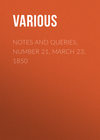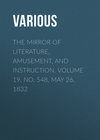Читать книгу: «Notes and Queries, Number 21, March 23, 1850», страница 2
DIRECT AND INDIRECT ETYMOLOGY
I have just been exceedingly interested in reading a lecture on the Origin and Progress of the English Language, delivered at the Athenæum, Durham, before the Teachers' Society of the North of England, by W. Finley, Graduate of the University of France.
The following passage well expresses a caution that should be always kept in mind by the literary archæologist:
"In the orthography of English words derived from the Latin, one great and leading principle must be kept in view. If the word is of new adoption, it is certain that its spelling will be like that which appears in the original word; or if it has come to us through the French, the spelling will be conformable to the word in that language; thus, persecution from persequor, pursue from poursuivre. Again, flourish from fleurir, efforescent, florid, &c., from floreo. And to establish our orthography on certain grounds, it ought to be the business of the lexicographer to determine the date of the first appearance of an adopted word, and thus satisfactorily determine its spelling." (Lecture, p. 20. footnote.)
D.V.S.
Home, March 2.
ERRORS IN POPE'S HOMER'S ODYSSEY
In all the editions I have seen of this translation, the following very palpable errors exist, which I do not remember to have seen noticed. The first of these errors is contained in book ix. lines 325, 326, 463, and 533,
"Fools that ye are! (the savage thus replies,
His inward fury blazing at his eyes.)"
"Sing'd are his brows: the scorching lids grow black."
"Seest thou these lids that now unfold in vain?"
and consists in Mr. Pope having bestowed two organs of sight on the giant Polypheme.
The second occurs in line 405 of the same book;
"Brain'd on the rock: his second dire repast;"
and is owing to the inadvertency of the translator, who forgets what he had previously written in lines 342 to 348.
"He answer'd with his deed: his bloody hand
Snatch'd two, unhappy of my martial band;
And dash'd like dogs against the stony floor;
The pavement swims with brains and mingled gore.
Torn limb from limb, he spreads his horrid feast,
And fierce devours it like a mountain beast."
And in lines 368 and 369;
"The task thus finish'd of his morning hours,
Two more he snatches, murders, and devours!"
by which it distinctly appears that line 405 has a reference to the third "dire repast" of the Cyclops, instead of the second.
Perhaps you will not deem me presumptuous in offering an amendment of these passages by the following substitutions:—
For lines 325 and 326,
Fools that ye are! (the savage made reply,
His inward fury blazing at his eye.)
for line 463,
Sing'd is his brow; the scorching lid grows black.
for line 405,
Brain'd on a rock: his third most dire repast.
and for line 533,
Seest thou this lid that now unfolds in vain?
DAVID STEVENS.
Godalming, Feb. 10. 1850.
PROVERBIAL SAYINGS AND THEIR ORIGINS—PLAGIARISMS AND PARALLEL PASSAGES
In a note to Boswell's Life of Johnson (Lond. 1816. 8vo.), iv. 196., the following lines are ascribed to their real authors:—
To Joh. Baptista Mantuanus (Leipz. 1511. 4to), Eclog. i.:—
"Id commune malum, semel insanivimus omnes."
To Philippe Gaultier, who flourished in the last half of the 12th century (Lugduni, 1558. 4to. fol. xlij. recto):—
"Incidis in Scillam cupiens vitare Charybdim."
At the conclusion of the same note, the authorship of
"Solamen miseris socios habuisse doloris,"
is said to remain undiscovered; but it appears to be a corrected form of a line in Albertus ab Eyb's Margarita Poetica (Nuremberg, 1472. Fol.), where, with all its false quantities, it is ascribed to Ovid:—
"Solacium est miseris socios habere poenarum."
Ovidius Epistolarum.
In the same page (fol. 149. rect.),
(sic) "Fecundi calices quem non fecere disertum"
is transferred from Horace to Ovid; while, on the reverse of the same fol., Æsop has the credit of
"Non bene pro toto libertas venditur auro;
Hoc coeleste bonum præterit orbis opes."
Of the first line of the couplet, Ménage says (Menagiana, Amstm. 1713. 12mo.), iii. 132., that it is "de la fable du 3'e Livre de ce même Poëte à qui nous avons dit qu'appartenoit le vers
"'Alterius non sit qui suus esse potest;'"
But I cannot find the reference to which he alludes.
In the same fol. (149 rect.) is perhaps the earliest quotation of
"Gutta cavat lapidem non vi sed sæpè cadende.—
Sapiens,"
which occurs also in Menagiana (Amstm. 1713. 12mo.), i. 209.:—
"Horace fait mention du Poëte Chérile, de qui l'on
n'a que ce vers Grec—
"Πετραν κοιλαινει ρανισ οδατοσ ενδελεχειη."
"Gutta cavat lapidem non vi sed sæpè cadendo."
The parallel passages in Ovid are in Epist. ex Pont. iv. x. 5.:—
"Gutta cavat lapidem; consumitur annulus usu,
Et feritur pressâ vomer aduncus humo,"
and in Art. Amat. l. 475, 476.:—
"Quid magis est saxo durum? quid mollius unda?
Dura tamen molli saxa cavantur aquâ."
F.C.B.
QUERIES
A TREATISE ON THE LORD'S SUPPER, BY ROBERT CROWLEY
I have before me a somewhat scarce volume of Theological Tracts (small 8vo.), ranging between the years 1533 and 1614. With the exception of one relating to the Sacraments, by John Prime (Lond. 1582), the most curious treatise is that entitled "The Supper of the Lorde, after the true meanyng of the sixte of John, &c.... wherunto is added, an Epystle to the reader, And incidentally in the exposition of the Supper is confuted the letter of master More against John Fryth." To a motto taken from 1 Cor. xi. is subjoined the following date, "Anno M.CCCCC.XXXIII., v. daye of Apryll," together with a printer's device (two hands pointing towards each other). This Tract was promptly answered by Sir Thomas More (A.D. 1533, "after he had geuen ouer the offyce of Lorde Chauncellour of Englande"), and is described by him as "the poysoned booke whych a nameles heretike hath named the Supper of the Lorde" (Works, pp. 1035, seqq., ed. Rastell). From the following passage of the reply, we learn that this offensive publication, like so many others of the same class, has been printed abroad:—
"And in thys wyse is ther sent ouer to be prynted the booke that Frythe made last against the blessed sacrament answering to my letter, wherewyth I confuted the pestilent treatice that he hadde made agaynst it before. And the brethen looked for it nowe at thys Bartlemewe tide last passed, and yet looke euery day, except it be come all redy, and secretly runne among them. But in the meane whyle, ther is come ouer a nother booke againste the blessed sacrament, a booke of that sorte, that Frythe's booke the brethren maye nowe forbeare. For more blasphemous and more bedelem rype then thys booke is were that booke harde to be, whyche is yet madde enough, as men say that haue seen it" (p. 1036. G.).
More was evidently at a loss to discover the author of this work; for, after conjecturing that it might have come from William Tyndal, or George Jaye (alias Joy), or "som yong unlearned fole," he determines "for lacke of hys other name to cal the writer mayster Masker," a sobriquet which is preserved throughout his confutation. At the same time, it is clear, from the language of the treatise, that its author, though anonymous, believed himself well known to his opponent:
"I would have hereto put mi name, good reader, but I know wel that thou regardest not who writteth, but what is writen; thou estemest the worde of the verite, and not of the authour. And as for M. More, whom the verite most offendeth, and doth but mocke it out when he can not sole it, he knoweth my name wel inough" (sub fin).
But here rises a grave difficulty, which I have taken the liberty of propounding to the readers of "Notes and Queries." Notwithstanding the above statements, both of the writer and of Sir Thomas More, as to the anonymous character of the treatise we are considering, the "Epistle to the Reader" is in my copy subscribed "Robert Crowley," naturally inducing the belief that the whole emanated from him.
Perhaps this difficulty may be resolved on the supposition that, while the body of the Tract was first published without the "Epistle to the Reader," and More's reply directed against it under this form, it might soon afterwards have reached a second edition, to which the name of the author was appended. It is certain that More's copy consisted of 32 leaves only (p. 1039, G.), which corresponds with that now before me, excluding the "Epistle to the Reader." Still, it is difficult to conceive that the paragraph in which the author speaks of himself as anonymous should have remained uncancelled in a second edition after he had drawn off what More calls "his visour of dissimulacion." There is, indeed, another supposition which would account for the discrepancy in question, viz. that the epistle and a fresh title-page were prefixed to some copies of the original edition; but the pagination of the Tract seems to preclude this conjecture, for B.i. stands upon the third leaf from what must have been the commencement if we subtract the "Epistle to the Reader."
Wood does not appear to have perceived either this difficulty, or a second which this treatise is calculated to excite. He places the Supper of the Lorde at the head of the numerous productions of Robert Crowley, as if its authorship was perfectly ascertained. But Crowley must have been a precocious polemic if he wrote a theological treatise, like that answered by More, at least a year previously to his entering the university. The date of his admission at Oxford was 1534; he was elected Fellow of Magdalene in 1542; he printed the first edition of Piers Plowman in 1550; and was still Parson of St. Giles's, near Cripplegate, in 1588, i.e. fifty-five years after the publication of the Tract we are considering. (See Heylin's Hist. of the Reformation, ii. 186., E.H.S. ed.) Were there two writers named Robert Crowley? or was the Crowley a pupil or protégé of some early reformer, who caused his name to be affixed to a treatise for which he is not wholly responsible? I leave these queries for the elucidation of your bibliographical contributors.
If I have not already exceeded the limits allowable for such communications, I would also ask your readers to explain the allusion in the following passage from Crowley's tract:
"And know right well, that the more they steare thys sacramente the broder shal theyr lyes be spreade, the more shall theyr falsehoode appeare, and the more gloriously shall the truthe triumph: as it is to se thys daye by longe contencion in thys same and other like articles, which the papists have so long abused, and howe more his lyes utter the truthe every day more and more. For had he not come begynge for the clergy from purgatory, wyth his 'supplicacion of soules,' and Rastal and Rochester had they not so wyselye played theyr partes, purgatory paradventure had served them yet another yere; neyther had it so sone haue bene quenched, nor the poor soule and proctoure there ben wyth his bloudye byshoppe christen catte so farre coniured into his owne Utopia with a sachel about his necke to gather for the proud prystes in Synagoga papistica."
The Rastell here mentioned was doubtless he whom More (Works, p. 355.) calls his "brother" (i.e. his sister's husband), joining him with Rochester (i.e. Bp. Fisher), as in this passage, on account of his great zeal in checking the progress of the earlier Reformation; but what is the allusion in the phrase "with his bloudye bishoppe christen catte," &c., I am unable to divine. Neither in the Supplicacion of Soules, nor in the reply to the "nameles heretike," have I discovered the slightest clue to its meaning.
C.H.
St. Catherine's Hall, Cambridge.
[It would seem from a Query from the Rev. Henry Walter, in No. 7. p. 109., on the subject of the name "Christen Cat," where the forgoing passage is quoted from Day's edition of Tyndale's Works, that this tract was by Tyndale, and not by Crowley.]
Покупайте книги и получайте бонусы в Литрес, Читай-городе и Буквоеде.
Участвовать в бонусной программе




















